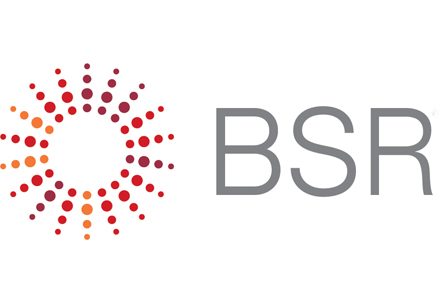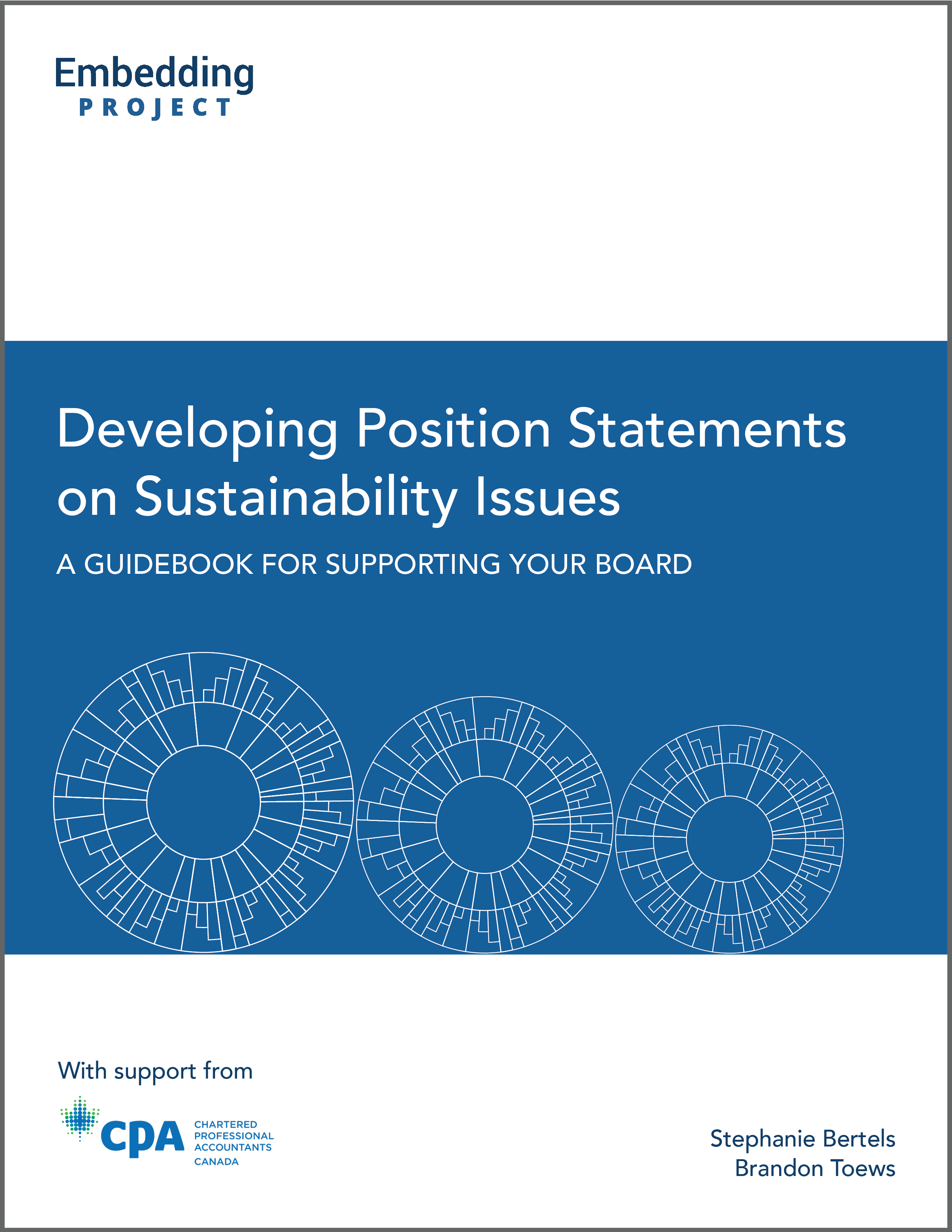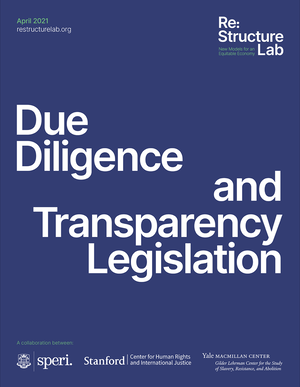Accountability, Transparency, and Disclosure
Description
Includes comprehensive sustainability disclosure; double materiality (impact and financial); public positions; public goals and progress against them; method and data source transparency; timeliness of information; clear and accessible communication; relevant reporting at facilities level; and provision of raw data.
Share this Subissue on:LinkedIn
Resources
Materiality
SASB Materiality Map
The Materiality Map was developed by the Sustainability Accounting Standards Board (SASB). It ranks issues by industry based on two types of evidence: evidence that investors in the industry are interested in the issue, and evidence that the issue has the ability to impact companies within the industry. Updated annually, this map is a good starting point to get a snapshot of industry specific priorities.
Materiality Assessments: Why It’s Time for a New Approach
Done well, corporate sustainability materiality assessments should improve the quality and relevance of your disclosures and ideally, clarify where your company needs to take action and inform your core business strategy. Unfortunately, most materiality assessments don’t live up to that promise. In this blog post, we reflect on how we got here and why the materiality assessment process is in desperate need of an overhaul.
Double Materiality Assessments: Criteria for a More Robust Process that Supports Strategy and Disclosure
Thinking about how to undertake a double materiality assessment? In this blog post, we share what we consider to be fundamental criteria for a better approach.
The double-materiality concept: Application and issues
If you are looking for a more comprehensive explanation of the concept and applicability of double materiality, this white paper from GRI may be of help. It draws on academic research to investigate how double-materiality is implemented in sustainability reporting and identifies some of the benefits and challenges when applying double-materiality in practice.
Double and Dynamic: How to Enhance the Value of Your Materiality Assessment
BSR has created a blog series focused on expanding the scope and value of materiality assessments. The first can help you to understand the value of taking a scenario-driven approach to double materiality, where stress-testing and scenario analysis are used to determine which sustainability issues are most likely to challenge and undermine the resilience of your organisation. The second can help you to understand the value of taking a scenario-driven approach to double materiality, where stress-testing and scenario analysis are used to determine which sustainability issues are most likely to challenge and undermine the resilience of your organisation. The third can help you to understand the benefits of focusing your materiality assessment on your company's impacts on communities, the environment, and other affected stakeholders rather than on decision-useful disclosures for investors and other report readers.
The Double Materiality Radar
Over the past five years, working with our partner companies, we have been developing, piloting, and refining a comprehensive, impact-oriented double materiality prioritisation process.
In this forthcoming guide, we will share this new approach to corporate sustainability materiality assessment, grounded in context and impacts, that brings more clarity to your disclosures, better insights to your corporate strategy process, and will help your company prioritise where to act to do its part to support sustainability.
To be notified when this guide is released, sign-up for our monthly newsletter or follow us on LinkedIn.
Other Resources
Sustainability Goals Database
Are you designing new goals or interested in benchmarking your goals against leading practice? To help advance progress in setting credible goals, we will maintain a public goals database containing leading sustainability goals and commitments set by large companies globally. Search by issue, company, industry, goal type, or SDG target.
If you are aware of goals that take a credible approach that should be featured in our database, please let us know.
Position Database
Is your company interested in taking a public position on an ESG issue?
To help companies develop strong, clear positions, we will maintain a public database containing leading positions articulated by large companies globally.
Our governance guide outlines how companies should articulate their positions, and we have applied this criteria to the positions featured in this database.
Developing Position Statements on Sustainability Issues
There is growing pressure among companies to link social and environmental limits to corporate strategy and goal-setting. However, the result is often a lengthy document that fails to make strategic connections between specific issues and their implications on business decision-making. We developed this guidebook to help you articulate a concise and transparent board level position on key environmental, social, and governance issues. Drawing upon in-depth analyses of over 4,000 board position statements; over 200 interviews with CEOs, directors, and board chairs; and concepts outlined in our series on the Road to Context, this guidebook provides a checklist for crafting a contextual board position statement and includes examples from a range of industries and global settings.
ESG Disclosure Handbook
As ESG reporting requirements evolve, many companies find themselves struggling to provide forward-looking, investor-grade information. This guide from WBCSD provides a 3-part structured process for selecting and structuring inputs during the ESG reporting decision-making process. For practitioners involved in corporate disclosure activities, this handbook directly addresses many of the most common questions that Boards of Directors and other executives have about ESG disclosure.
Five Steps to Good Sustainability Reporting
This report from BSR draws on features from notable reporting standards and frameworks - including GRI, SASB, and the TCFD - and presents a five-step process for effective disclosure. While the first step in couched in materiality, from which leading companies are moving beyond, steps 2-5 will be particularly helpful for first-time reporters to better evaluate and understand their audience and the presentation and formatting of their report.
A Guide to Traceability: A Practical Approach to Advance Sustainability in Global Supply Chains
Traceability is an important part of developing a sustainable value chain. Part II of this guide from the UN Global Compact can help you to familiarise yourself with the three main approaches to traceability: Product Segregation, Mass Balance, and Book and Claim. Part III offers practical guidance on implementing traceability. The guide also includes an annex that lists the most relevant traceability issues and actors for ten common commodities.
The Accountability Framework
This framework from the Accountability Framework initiative (AFi) features twelve core principles for building, strengthening, and supporting ethical supply chains. These principles serve as a guide for companies and others in setting, implementing, monitoring, and reporting on effective goals and commitments on deforestation, ecosystem conversion, and human rights in ethical supply chains.
AFi has developed operational guidance to help you put the core principles into practice; a self-assessment tool to help you benchmark and align your policies, operations, and business practices against the framework; and other related tools and guides.
Operational Guidance: Workers' Rights
This resource from the Accountability Framework Intiative can help you to understand the scope of your organisation's responsibilities to respect the rights of workers in commodity supply chains; ways to identify impacts to these rights; and actions to ensure respect for these rights. It summarises key workers' rights provisions and provides implementation guidance and links to support. It also identifies roles and responsibilities for commodity purchasers, such as internal capacity building and training, supplier screening and engagement, and remediation of adverse impacts to workers' rights. This resource will be especially beneficial to procurement and sustainability professionals.
Due Diligence and Transparency Legislation
This brief from Re:Structure Lab can help you to better understand key requirements for strong and effective human rights due diligence legislation and practices to address the business drivers of forced labour along the supply chain. The brief explains how governments can use mandatory human rights due diligence as a key tool - alongside broader legal reforms - to drive wide ranging changes to business practices along end-to-end supply chains. It also explores government solutions that companies can support, such as human rights due diligence legislation and transparency legislation reform.
Social Auditing and Ethical Certification
This brief by Re:Structure Lab proposes a set of reforms to address key supply chain auditing challenges. These include increasing NGO, union, and worker-led involvement, as well as addressing financial conflicts of interest between auditors and business.
Guidelines for Providing Product Sustainability Information
These guidelines from UNEP can help you to make effective, trustworthy claims to consumers on product-related sustainability information. Developed through multi-stakeholder consultation, the guidelines address the underlying causes of information overload, consumer confusion, and mistrust. The structure of these guidelines reflects a dual objective: to establish minimum requirements that must be met when providing product sustainability information to consumers ("Fundamental Principles"); and to encourage ambition, improvement, and sustainability leadership over time ("Aspirational Principles"). This resource will be especially beneficial to marketing and advertising professionals.
Earning Digital Trust: Decision-Making for Trustworthy Technologies
Failures related to digital technologies (such as artificial intelligence, the security of personal information, and algorithmic predictions) have eroded societal confidence at an unprecedented scale and rate and are contributing to broad and growing mistrust in science and technology. This insight paper from the World Economic Forum can help you to make better, more trustworthy decisions regarding technology. It defines "digital trust" globally and introduces a "digital trust framework" to guide decision-making. The framework defines shared goals or values that inform the concept of digital trust, including security and reliability; accountability and oversight; and inclusive, ethical, and responsible use. The framework further defines eight dimensions against which the trustworthiness of digital technologies can be operationalised and evaluated: cybersecurity, safety, transparency, interoperability, auditability, redressability, fairness, and privacy. This paper also lays out a four-step digital trust roadmap that can help guide and align decision-making with societal expectations.
UN Guiding Principles Assurance Guidance
As companies improve their processes to reduce human rights risks and impacts, they need ways to assure that these processes are having the intended effects. Complementing the United Nations Guiding Principles on Business and Human Rights (UNGPs), this guidance can help internal auditors assure companies’ human rights performance and support external assurance providers’ assurance of companies’ human rights reporting. The guidance is divided into four parts. Part 1 provides an introduction to the UN Guiding Principles Reporting Framework, including a backgrounder and information on the rationale, intended users, and objectives; Part 2 explains how this guidance builds upon existing standards, discusses necessary competencies for expert practitioner teams when conducting assurance, and highlights factors of heightened importance for human rights assurance; Part 3 provides expert conclusions; Part 4 explains the structure and content of the indicators and can help users identify the relevant types of evidence for assuring a company's human rights performance or reporting; and Part 5 provides a glossary of terms.
Achieving Effective Internal Control over Sustainability Reporting (ICSR): Building Trust and Confidence in Sustainable Business Information Through the COSO Internal Control-Integrated Framework
This comprehensive guide from the Committee of Sponsoring Organisations of the Treadway Commission (COSO) explains how to develop and implement effective internal controls that can help your organisation to articulate its purpose, set its objectives and strategy, and improve the credibility of all types of data and information. Building on the COSO Internal Control - Integrated Framework, refreshed in 2013 (ICIF-2013), this guidance demonstrates how internal controls have value beyond compliance and external financial reporting and are applicable to an organisation’s sustainable business activities and information. The guide provides points of focus and insights for the seventeen ICIF-2013 Principles, dividing them into five key components: control environment, risk assessment, control activities, information and communication, and monitoring activities. This resource will benefit a wide range of corporate professionals, including those in sustainability, finance and accounting, risk management, legal, and internal auditing roles.















